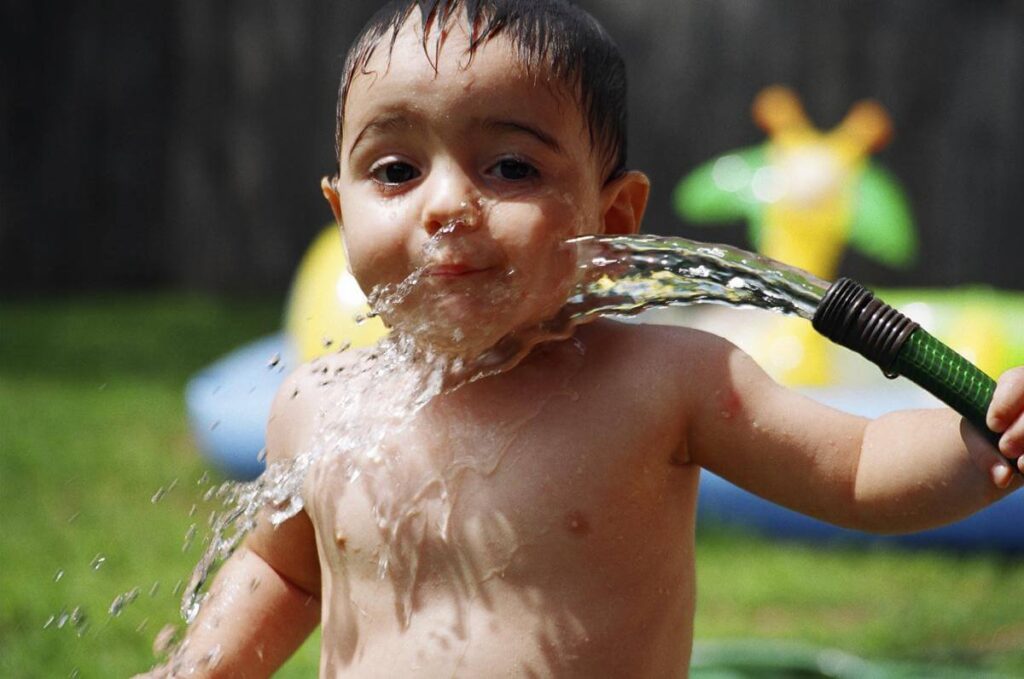It’s summer season, and it’s sizzling. What may very well be extra healthful and refreshing on a sizzling, sunny day than children operating via the sprinkler and consuming from the backyard hose, proper?
However what if that hose is delivering a big dose of heavy metals and poisonous plasticizers to your youngsters and your backyard?
The Poisonous Soup in Your Backyard Hose
Based on testing from the Ecology Center, the typical backyard hose delivers a veritable soup of poisons.
The Middle examined 32 new backyard hoses from Amazon, Lowe’s, Dwelling Depot, Walmart, Goal, and Meijer, and analyzed ranges of:
- lead,
- cadmium,
- tin,
- mercury,
- arsenic,
- antimony,
- bromine (related to brominated flame retardants),
- chlorine (indicating the presence of polyvinyl chloride, or PVC),
- phthalates, and
- bisphenol A (BPA).
These metals and chemical substances have been linked to beginning defects, impaired studying, diabetes, weight problems, liver toxicity, untimely births, hormone disruption, most cancers, and infertility, amongst different well being issues.
A lot of the hoses they examined had been comprised of polyvinyl chloride (PVC), a sort of plastic that usually accommodates phthalates, BPA and organotins, all of which may intrude with hormonal and reproductive growth.
38% of the hoses examined additionally contained bromine and antimony, chemical substances that may result in thyroid, kidney and liver harm with extended publicity.
The hoses had been additionally examined for phthalates, a category of chemical substances added to plastics and beauty merchandise to maintain them smooth and versatile. Phthalates have been linked to hormonal imbalances, most cancers, sterility in males, lowered IQ, and behavioral issues in youngsters. 75% of all of the PVC hoses contained phthalates, and even a number of of the “consuming water secure” hoses contained phthalates!
Lastly, they left 7 hoses stuffed with water to sit down outdoors within the solar for 2 days, after which examined the water to see what was in it. The hose water contained lead, phthalates and bisphenol A at ranges a lot increased than the consuming water limits set by the Environmental Safety Company and the Meals and Drug Administration.
If that weren’t unhealthy sufficient, its not simply the hose itself that’s poisonous. Steel fixtures on hoses aren’t required to stick to the bounds on heavy metals that residence taps are, so even when the plastic hose itself is secure, the connectors may very well be including result in your water.
One-third of hoses examined had lead ranges over 100ppm. There’s no secure restrict for lead, and even the tiniest quantities are toxic.
Extra on Protected, Clear Water
Backyard Hoses Can Pollute Your Backyard Too
It’s not simply your children, livestock, and pets consuming the water that it’s a must to fear about. Though the Ecology Middle didn’t check for antimony, phthalates, or BPA in crops watered with these hoses, Jeff Gearhart, analysis director at Ecology Middle, says it’s very potential that your hose may very well be contaminating your vegetable backyard too.
“We all know that these chemical substances make it into crops,” he says, referring to research which have found high levels of phthalates in organic food. “We simply can’t present a connection between hoses and chemical substances displaying up in a plant but.”
Thankfully, there are a lot safer hose alternate options out there if you understand how to seek out them.
How you can Discover a Protected Backyard Hose
Whereas no backyard hose is ideal, there are some safer decisions:
Select a rubber hose.
Pure rubber hoses don’t want phthalates, BPA or UV stabilizers to maintain them versatile. The Dramm Premium Rubber hose earned the “Low Hazard” score within the Ecology Middle’s checks, although it’s not rated “consuming water secure.” This one is nice for gardening and washing up solely.
Select “consuming water secure” hoses.
The most secure backyard hoses have the label “consuming water secure.” Many of those backyard hoses are additionally labeled “lead-free”, “BPA-free” and “phthalate-free.” Two nice decisions are the light-weight Water Right hose or the extra conventional Camco hose. For a light-weight, kink-free hose that is available in quite a lot of sizes, attempt the AquaJoe.
Retailer your hose in a cool, darkish place.
Warmth and daylight can break down your hose, it doesn’t matter what it’s comprised of, and enhance the leaching of chemical substances into the water. Protecting your hose out of the warmth and solar may also tremendously lengthen its life.
Let your hose run a bit earlier than utilizing the water from it.
This may flush out any metals or chemical substances which have leached into the water sitting within the hose whilst you weren’t utilizing it.
Up to date June 20, 2021
